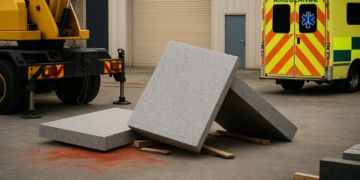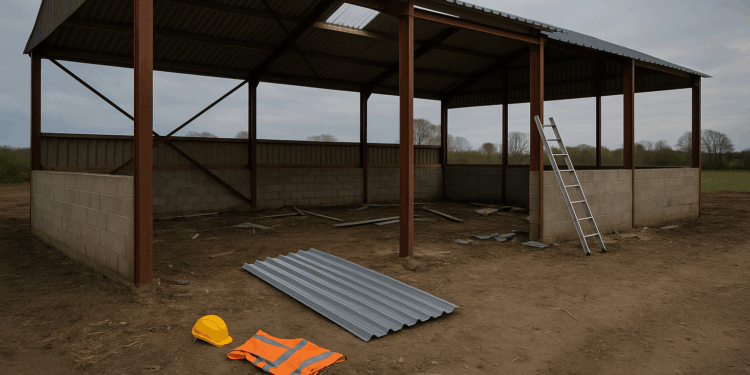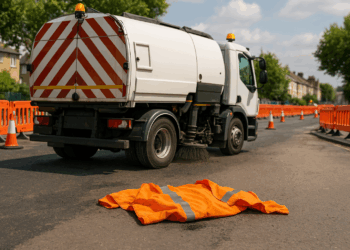Story Highlight
– Worker fell while installing roof sheeting in Shropshire.
– Dewi Williams Limited failed to plan work safely.
– Significant injuries included fractured ribs and skull.
– Company fined £15,000 for safety breaches.
– HSE emphasizes risk assessment for work at height.
Full Story
A construction firm has been penalised following a serious incident in Shropshire where a worker sustained significant injuries after falling from a height during construction activities on a barn. The employee, hired by Dewi Williams Limited, was engaged in installing roof sheeting at a construction site situated in Oswestry when the accident occurred.
On 2 September 2023, the worker was working on a roof sheet that he had recently fitted. While he was in the process of positioning the next sheet, he lost his balance and fell to the ground below. As a result of the fall, he suffered multiple injuries, including fractures to his skull and ribs.
An inquiry conducted by the Health and Safety Executive (HSE) disclosed that Dewi Williams Limited had inadequately planned the construction work and failed to enforce necessary safety measures to mitigate the risks associated with working at height. Furthermore, it was discovered that Dewi Williams, the director of the company, was directly involved in the project and had permitted the task to proceed without proper safety protocols in place.
Working at height continues to be a significant contributor to workplace injuries and fatalities in the UK, prompting the HSE to release comprehensive guidance on the subject. The Work at Height Regulations 2005 stipulate that all work at elevated positions must be meticulously planned, supervised, and executed in a safe manner to protect workers from potential falls.
Dewi Williams Limited, located in Lowlands, Crickheathe, Oswestry, received a penalty of £15,000 after pleading guilty to violations of Regulations 4(1) and 6(3) of the Work at Height Regulations 2005. In addition to the fine, the firm was ordered to cover costs amounting to £2,000.
Furthermore, Dewi Williams, also from Lowlands, was found guilty under Section 37 of the Health and Safety at Work etc. Act 1974 for the same breaches. He received a conditional discharge for a duration of 12 months and was directed to pay £1,000 in costs.
Sara Andrews, an inspector with the HSE, commented on the incident, highlighting the critical nature of thoroughly assessing risks associated with working at height. She stated, “This case emphasises the importance of properly assessing the risks associated with all work at height activities. Suitable control measures should be implemented to minimise the risk of workers falling and suffering injury. Had this work been properly planned, and suitable work equipment provided, this incident would not have happened.”
The prosecution was undertaken by HSE enforcement lawyer Matthew Reynolds, assisted by paralegal officer Sarah Thomas, who advocated for workplace safety standards to prevent such incidents in the future.
This incident serves as a grave reminder of the inherent dangers associated with construction work at heights, underscoring the imperative for companies to adhere to established safety protocols. The HSE’s commitment to workplace health and safety reinforces the ongoing need for vigilance in construction practices across the industry.
For more information on safe practices while working at heights, individuals can find guidance on the HSE website, which offers detailed resources on legislation and safety measures.
The HSE remains dedicated to protecting both the workforce and the public, emphasising the necessity for a deeper commitment to safety in all construction environments. Through robust enforcement of safety regulations and proactive measures, the aim is to safeguard lives and reduce the incidence of accidents within the sector.























This incident is a stark reminder that working at height requires thorough planning and effective control measures every time. Proper risk assessment, use of suitable edge protection or access equipment, and clear supervision are not optional. Employers must ensure workers are trained, equipment is inspected and that safe systems of work are followed to prevent life changing injuries.
This incident is a stark reminder that planning and basic safety controls are not optional. Work at height carries serious risks and employers must ensure suitable risk assessments, appropriate access and edge protection, safe systems of work and adequate supervision. Training and the right equipment save lives. The fine and the injuries sustained underline why HSE enforcement matters and why organisations must learn from these failures to prevent future harm.